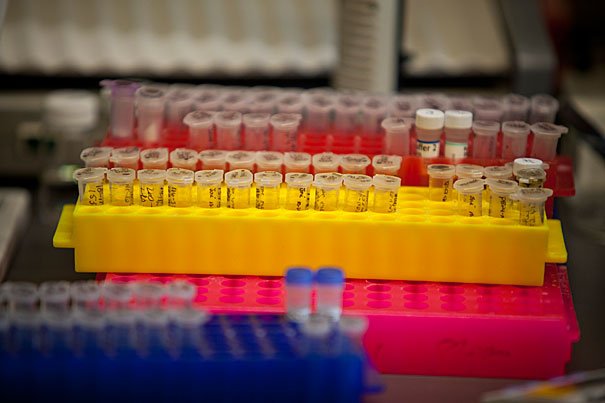
Costs of treatment for certain common cancers are as little as $100 per course of treatment in developing nations.
Justin Ide/Harvard Staff Photographer
Affordable cancer treatments available
Report reveals how millions of lives could be saved in developing countries
More than 2.4 million cancer deaths could be avoided each year in developing countries using prevention and treatment interventions that are affordable and that could be made widely available, according to a new report. And deaths due to children’s cancers are among those that could be curtailed most easily. Costs of treatment for certain common cancers are as little as $100 per course of treatment in developing nations.
Even more disturbing, low-cost pain relief medications remain largely inaccessible to patients in developing countries, meaning that most people with cancer worldwide suffer tremendous pain — needlessly — before they die, the report’s authors say.
These findings come from the report, “Closing the Cancer Divide: A Blueprint to Expand Access in Low and Middle Income Countries,” being released today by an international group of experts organized by the Global Task Force on Expanded Access to Cancer Care and Control in Developing Countries (GTF.CCC), and hosted by a consortium of organizations that includes Harvard School of Public Health, Harvard Global Equity Initiative, Harvard Medical School, Dana-Farber Cancer Institute, Brigham and Women’s Hospital, and Partners In Health.
Once considered a problem only in wealthy countries, cancer is now a leading cause of death in low- and middle-income countries. About 55 percent of the world’s 12.7 million new cases and 65 percent of the 7.6 million cancer deaths each year occur in these nations.
The report was discussed at a daylong symposium Oct. 28 at Harvard Medical School. It was attended by representatives from national governments from low- and middle-income countries, global and national civil society organizations, the private sector, academia, and donors.
Lead authors of the report: The report has more than 115 contributors from around the world. The lead authors include Felicia Knaul, director, Harvard Global Equity Initiative, associate professor, Harvard Medical School, Global Task Force on Expanded Access to Cancer Care and Control in Developing Countries, founder, Cáncer de Mama: Tómatelo a Pecho; Julio Frenk, dean of Harvard School of Public Health and GTF.CCC co-chair; Lawrence Shulman, chief medical officer and senior vice president medical affairs, Dana-Farber Cancer Institute, co-chair GTF.CCC; Jonathan Quick, president and chief executive officer, Management Sciences for Health; Rifat Atun, director of strategy, performance and evaluation cluster, The Global Fund to Fight AIDS, Tuberculosis and Malaria; Nancy Keating, associate professor of medicine and health care policy, Department of Health Care Policy, Harvard Medical School; Peter Piot, director, London School of Hygiene and Tropical Medicine; Sir George Alleyne, chancellor of the University of West Indies; Julie Gralow, professor of medical oncology, University of Washington, School of Medicine; Paul Farmer, co-founder, Partners In Health, chair of Department of Global Health and Social Medicine, Kolokotrones University Professor of Global Health and Social Medicine, Harvard Medical School.




